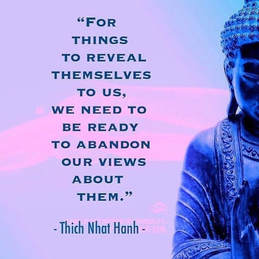
Reading from Wherever You Go There You Are by Jon Kabat-Zinn
"It doesn’t take long in [yoga] to discover that part of our mind is constantly evaluating our experiences, comparing them with other experiences or holding them up against expectations and standards that we create, often out of fear. Fear that I’m not good enough, that bad things will happen, that good things won’t last, that other people might hurt me, that I won’t get my way, that only I know anything, that I’m the only one who doesn’t know anything. We tend to see things through tinted glasses: through the lens of whether something is good for me or bad for me or whether or not it conforms to my beliefs or philosophy. If it is good, I like it. If it is bad, I don’t like it. If it is neither, I have no feelings about it one way or the other, and may hardly notice it at all.
When you dwell in stillness, the judging mind can come through like a foghorn. I don’t like the sensation in my knee…. This is boring…. I like this feeling; I had a good [yoga practice] yesterday, but today I’m having a bad [yoga practice]. …It’s not working for me. I’m no good at this. I’m no good period. This type of thinking dominates the mind and weighs it down. It’s like carrying around a suitcase full of rocks on your head. It feels good to put it down. Imagine how it might feel to suspend all your judging and instead to let each moment be just as it is, without attempting to evaluate it as "good" or "bad." This would be true stillness, a true liberation.
[Yoga is a practice] of cultivating a non-judging attitude towards what comes up in the mind, come what may. That doesn’t mean judging won’t be going on. Of course it will, because it is in the very nature of the mind to compare and judge and evaluate. When it occurs, we don’t try to stop it or ignore it, any more than we would try to stop any other thoughts that might come through our mind.
The tack we take in [yoga] is simply to witness whatever comes up in the mind or the body to recognize it without condemning it or pursuing it, knowing that our judgments are unavoidable and necessarily limiting thoughts about experience. What we are interested in [with yoga] is direct contact with the experience itself – whether it is of an inbreath, an outbreath, a sensation or feeling, a sound, an impulse, a thought, a perception, or a judgment. [In this way] we can act with much greater clarity in our [practice, without immersion] in a stream of unconscious liking and disliking, which screens us from the world and from the basic purity of our own being."
Beginning from "Where We Are" from The Heart of Yoga
"When we go into a posture or carry out a movement that feels tense, it is difficult to notice anything else besides that tension. Perhaps when we sit in a cross-legged position our only thought is for the pain in our strained ankles. In doing this we are not really in the asana we are striving for – we are obviously not yet ready for this particular position. Rather, we should first practice something easier. This simple idea is the foundation for our whole yoga practice. Practicing the postures progressively, we gradually achieve more steadiness, alertness, and overall comfort.
If we want to make this principle of asana practice a reality, we have to accept ourselves just as we are.
If we have a stiff back we have to acknowledge this fact. It may be that we are very supple but our breath is very short, or perhaps our breathing is all right but our body gives us certain problems. It is also possible to feel comfortable in an asana while the mind is somewhere completely different. That is not asana either. It is only possible to find the qualities that are essential to asana if we recognize our own starting point and learn to accept it."
This quote from Being Peace by Thich Nhat Hanh, speaks more abstractly to our theme, allowing us to think about non-judgment as an enlightened frame of mind.
"Do not think that the knowledge you presently possess is changeless, absolute truth. Avoid being narrow-minded and bound to present views. Learn to practice non-attachment from views in order to be open to receive others’ viewpoints. Truth is found in life and not merely in conceptual knowledge. Be ready to learn throughout your entire life and to observe reality in yourself and in the world at all times."
CLOSING DHARMA QUOTE
Cultivating Non-judgment Quote by Rumi
"Out beyond ideas of wrongdoing and rightdoing there is a field. I’ll meet you there. When the soul lies down in that grass, the world is too full to talk about."
 RSS Feed
RSS Feed